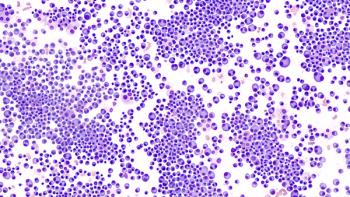
Nivolumab Plus Ipilimumab Maintains Survival Benefit at 8 Years in Advanced Renal Cell Carcinoma
Compared to sunitinib, nivolumab plus ipilimumab showed increased overall survival and durable response benefits in patients with advanced renal cell carcinoma.
Benefits of treatment with nivolumab (Opdivo) plus ipilimumab (Yervoy), including superior survival and durable responses, were maintained at 8 years in patients with advanced renal cell carcinoma (aRCC) compared with treatment with sunitinib (Sutent), according to an analysis of the CheckMate 214 trial (NCT02231749).
“This analysis comparing [nivolumab plus ipilimumab] with [sunitinib] from the CheckMate 214 trial represents the longest follow-up currently reported in a phase III trial for any first-line immune checkpoint inhibitor combination therapy in patients with previously untreated aRCC,” the study authors wrote in the paper published in the Annals of Oncology. “These results indicate sustained survival and unprecedented response benefits in patients with aRCC and continue to provide compelling support for [nivolumab plus ipilimumab] as a first-line standard of care for patients with aRCC and intermediate/poor risk in the long term.”
During a median follow-up of 8 years, patients treated with nivolumab plus ipilimumab had a significant overall survival (OS) benefit compared with those treated with sunitinib in the intent-to-treat population (HR = 0.72;95% CI, 0.62-0.83). The median OS was 52.7 months (95% CI, 45.8-64.5) in the nivolumab plus ipilimumab group compared with 37.8 months (95% CI, 31.9-43.8) in the sunitinib group.
Patients with intermediate or poor risk disease in the nivolumab plus ipilimumab arm also had a superior OS vs the sunitinib arm (HR = 0.69; 95% CI, 0.59-0.81), with a median OS of 46.7 months (95% CI, 35.0-55.7) and 26.0 months (95% CI, 21.8-32.6), respectively.
Additionally, patients with favorable risk disease had improved OS with nivolumab plus ipilimumab compared with sunitinib (HR = 0.82; 95% CI, 0.60-1.13), demonstrating a median OS of 77.9 months (95% CI, 64.6-91.6) and 66.7 months (95% CI, 56.0-79.9), respectively.
“The approval of [nivolumab plus ipilimumab] transformed the first-line treatment landscape for aRCC and extended lives for many patients living with this historically difficult-to-treat disease,” study authors wrote.
The probability of progression-free survival (PFS) at 90 months in the intent-to-treat population was 22.8% in the nivolumab plus ipilimumab group compared with 10.8% in the sunitinib group. These probabilities were 25.4% vs 8.5% in the intermediate/poor-risk group, respectively, 12.7% vs 17.0% in the favorable-risk group.
Overall response rates (ORR) for the intent-to-treat, intermediate/poor-risk, and favorable-risk groups, when nivolumab plus ipilimumab was compared with sunitinib, were 39.5% vs 33.0%; 42.4% vs 27.5%; and 29.6% vs 51.6%, respectively.
With regard to complete response rates, treatment with nivolumab plus ipilimumab derived a higher complete response rate compared with sunitinib in the intent-to-treat, intermedia/poor-risk, and favorable-risk groups, with rates of 12.0% vs 3.5%; 11.8% vs 2.6%; and 12.8% vs 6.5%, respectively.
The median duration of response (DOR) was 76.2 months (95% CI, 59.1-not estimable [NE]) with nivolumab plus ipilimumab compared with 25.1 months (95% CI, 19.8-33.2) with sunitinib in the intent-to-treat population. These rates were 82.8 months (95% CI, 54.1-NE) and 19.8 months (95% CI, 16.4-26.4), respectively, in the intermediate/poor-risk group and 61.5 months (95% CI, 27.8-NE) and 33.2 months (95% CI, 24.8-51.4) in the favorable-risk group.
The incidence of treatment-related adverse events (TRAEs) were consistent in both treatment groups when compared with previous reports; however, fewer grade 3-4 TRAEs occurred in patients treated with both nivolumab plus ipilimumab compared with sunitinib (48.4% vs 64.1%).
In the CheckMate 214 trial, 1096 patients with aRCC were randomized to receive either nivolumab plus ipilimumab or sunitinib. Patients assigned nivolumab plus ipilimumab received 3mg/kg of nivolumab plus 1 mg/kg of ipilimumab every 3 weeks in 4 doses, followed by nivolumab at either 3 mg/kg, 240 mg every 2 weeks, or 480 mg every 4 weeks). Those assigned sunitinib received 50 mg once a day for 4 weeks on then 2 weeks off.
Endpoints of the trial included OS, independent radiology review committee-assessed PFS, and ORR measured in the intermediate/poor risk (primary), intent-to-treat (secondary), and favorable-risk (exploratory) patient groups.
Reference
Tannir NM, Albigès L, McDermott DF, et al. Nivolumab plus ipilimumab versus sunitinib for first-line treatment of advanced renal cell carcinoma: extended 8-year follow-up results of efficacy and safety from the phase III CheckMate 214 trial. Ann Oncol. Published online August 2, 2024. doi:10.1016/j.annonc.2024.07.727
Newsletter
Knowledge is power. Don’t miss the most recent breakthroughs in cancer care.















































































